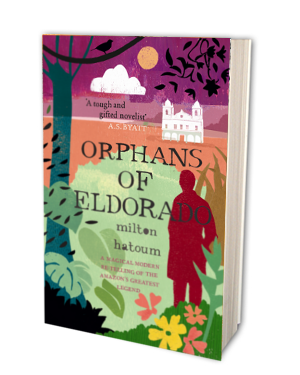Fascinating re-telling of an ancient Amazonian myth

“Don’t we breathe through what we speak? Don’t story-telling and singing blot out our pain?”
The Amazon River and rainforest have captivated, provoked, even frightened, since the earliest times of human habitation. In Orphans of Eldorado, Milton Hatoum evokes the legend of The Enchanted City - a shining city of gold at the bottom of the Amazon River where people live as enchanted beings.
The story is set in Manaus, the capital of Brazil’s Amazona region. Here Amando Cordovil runs a shipping empire with the help of his trusty lawyer Estiliano. Arminto Cordovil, Amando’s son and the narrator of the story, is somewhat estranged from his father. One day he receives notification that his father would like to see him and the two agree to meet.
But before they can do so Amando dies suddenly and Arminto inherits a fortune. He, however, becomes obsessed by Dinaura, a woman who lives with nuns. His passion for her blinds him to the slow decay of his shipping empire and when the Eldorado – a boat with much of his cargo onboard – sinks, he is left with nothing.
And Dinaura disappears. According to the whispers around the town, she has been taken to The Enchanted City, most likely by an anaconda or river dolphin if the myth is to be believed. But once submerged, one can never return to the world above without the help of a shaman.
The novel overtly acknowledges its place among the pantheon of myths. The beginning summons up tales of a man who is strangled by his own enormous penis and a woman who has relations with a tapir.
Hatoum seems to be telling us that myth and legend are a constant of human interaction. Language structures reality because language is the intermediary between the world and our experience of the world. And stories are the very essence of language.
As the narrator thinks to himself when he is poor and old: “No one recognised a Cordovil from the past. I might as well have been in the skin of one of the peddlars: the difference was our stories. But isn’t that everything anyway?”
So what is the difference between a lie and truth, between fiction and a true story? Hayden White argues that the historian, “arranges the events in the chronicle into a hierarchy of significance by assigning events different functions as story elements [...] with a discernible beginning, middle, and end”.
The stories of history are reliant on narrative forms similar to fiction – history must be created by a storyteller. History must be told as a story and communicated in such a way and received by an audience.
But what if our notions of truth and objectivity, rigorously equated with the discourse of history, were somewhat more shaky than we care to imagine? Do we relate to myths any differently than we do histories? Both are consciously alive in our imagination. What is past is past but lives on in memory. After all, Arminto Cordovil asks, “perhaps a repeated lie is just an imitation of the truth?”
Javier Marias wrote that his novel, The Man of Feeling, “is a love story in which love is neither seen nor experienced, but announced and remembered”. Orphans of Eldorado could be labelled in this way also. Arminto spends most of his life dreaming of, thinking about, Dinaura. He spends most of the tale recounting his search for her.
But their love is only a moment, a fleeting instant in the rush of the world around them. Perhaps this is the only way love can be experienced?
As always there are questions of translation. Hatoum writes in Portuguese but John Gledson makes the prose shimmer and shine. It slithers its way through the tale, with no chapter breaks, like an anaconda in the Amazon. It is a world in which the reader soon finds himself lost and is a highly enjoyable read.
Canongate’s Myths series seeks to re-imagine ancient myths and legends. Writers involved in the project include Karen Armstrong, Margaret Atwood, A.S. Byatt, Su Tong and Sally Vickers.
The first eleven of the Myths series were published in hardback but recently the publishers switched to paperback, much to the consternation of their readers. The official page for Orphans of Eldorado has received a plenitude of complaints about this but once the covers are opened the reader is thrust into a fascinating world where the demarcation between legend, myth, fiction and reality is faint.
Milton Hatoum – Orphans of Eldorado
Published by Canongate
Paperback: 164 pages
£9.99
ISBN: 978-1-84767-300-8
